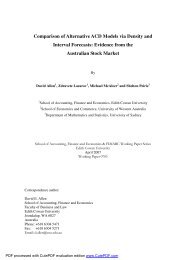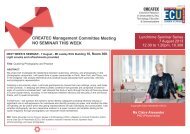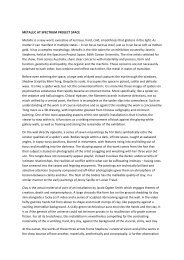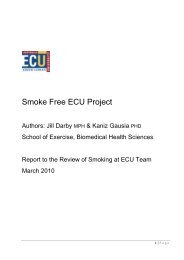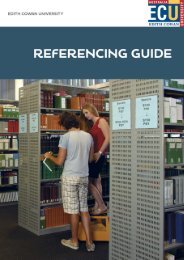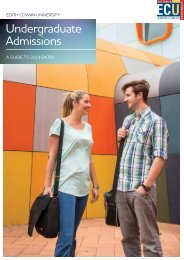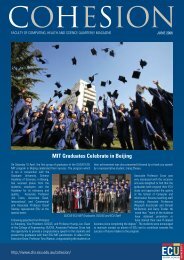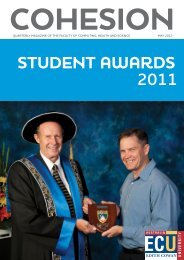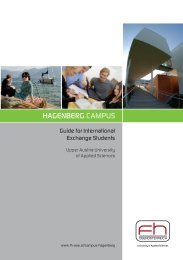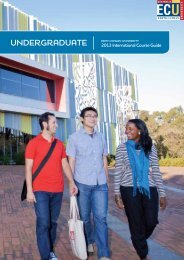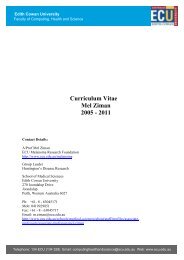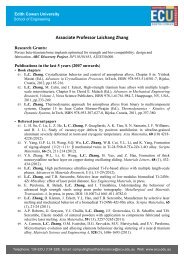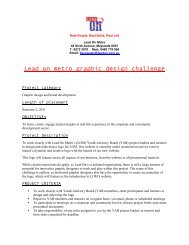Inside This Edition Celebrating the unique Australian Culture
Inside This Edition Celebrating the unique Australian Culture
Inside This Edition Celebrating the unique Australian Culture
Create successful ePaper yourself
Turn your PDF publications into a flip-book with our unique Google optimized e-Paper software.
ABOVE: Kurongkurl Katitjin’s Professor Colleen Hayward Acknowledging<br />
Country at <strong>the</strong> 2011 Oz Concert at Government House Gardens<br />
<strong>Celebrating</strong> <strong>the</strong> <strong>unique</strong> <strong>Australian</strong> <strong>Culture</strong><br />
Birak <strong>Edition</strong>: Dec/Jan 2010-2011<br />
<strong>Inside</strong> <strong>This</strong> <strong>Edition</strong><br />
Two significant cultural events, <strong>the</strong> Oz Concert and <strong>the</strong> Too Solid Music Festival, were<br />
recently celebrated on <strong>the</strong> 25 and 26 January 2011.<br />
The Oz Concert, held on <strong>the</strong> evening of <strong>the</strong> 25 January, brought toge<strong>the</strong>r hundreds<br />
of talented performers from WA’s leading creative, cultural and community groups<br />
for a spectacular showcase of talent. Over 6000 people attended <strong>the</strong> free concert at<br />
Government House Gardens organised by Celebrate WA.<br />
Story continued on page 3<br />
© Photo reproduced courtesy of Celebrate WA<br />
Kurongkurl Katitjin, pronounced ‘koor-ong-kurl cut-it-chin’, is a Nyoongar<br />
phrase meaning ‘coming toge<strong>the</strong>r to learn’.<br />
Student<br />
Information Office<br />
Welcome<br />
Students<br />
New ML<br />
Accommodation<br />
2011 is<br />
IWD Centenary<br />
NAIDOC Week<br />
2011
Welcome from <strong>the</strong> Head of Centre<br />
Welcome to <strong>the</strong> Birak edition of Our Place, <strong>the</strong> official newsletter of Kurongkurl Katitjin,<br />
Centre for Indigenous <strong>Australian</strong> Education and Research at Edith Cowan University.<br />
In this edition of Our Place, we officially welcome our readers to 2011. The new year<br />
always brings about new challenges and opportunities to which we always look forward<br />
with a sense of optimism and excitement.<br />
As we begin <strong>the</strong> new year, we welcome our students onto campus, especially those at<br />
<strong>the</strong> beginning of <strong>the</strong>ir study journey and new to Edith Cowan University. With a number<br />
of events and information sessions as part of ECU’s Orientation program, students are<br />
well supported with <strong>the</strong>ir transition into University life.<br />
Additionally, <strong>the</strong> near-completed apartments on <strong>the</strong> Mount Lawley campus will give<br />
students an even wider range of accommodation options!<br />
Also in this edition, we highlight <strong>the</strong> <strong>unique</strong> and diverse <strong>Australian</strong> culture, namely<br />
through <strong>the</strong> Oz Concert and Too Solid concert as part of Australia Day celebrations in<br />
Perth.<br />
With big things planned for 2011, <strong>the</strong> Our Place newsletter will<br />
be <strong>the</strong> place to hear news first!<br />
Until next time.....<br />
Happy reading!<br />
Professor Colleen Hayward<br />
About <strong>the</strong> Centre<br />
ECU’s Kurongkurl Katitjin has a vital role in assisting <strong>the</strong> University to meet its commitment<br />
to Indigenous peoples.<br />
Our mission is to “provide excellence in teaching<br />
and learning and research in a culturally inclusive<br />
environment that values <strong>the</strong> diversity of Indigenous<br />
<strong>Australian</strong> history and cultural heritage”.<br />
Consistent with this mission, <strong>the</strong> Centre provides support<br />
and academic pathways for Indigenous students<br />
and opportunities for non-Indigenous students to<br />
enhance <strong>the</strong>ir professional knowledge and cultural<br />
competence.<br />
2
3<br />
<strong>Celebrating</strong> <strong>the</strong> <strong>unique</strong> <strong>Australian</strong> <strong>Culture</strong> Continued from page 1<br />
Over 10,000 people flocked to <strong>the</strong> Supreme Court Gardens on Australia Day for <strong>the</strong> Too<br />
Solid Music Festival.<br />
Presented by City of Perth, Abmusic and Noongar Radio, <strong>the</strong> seven<br />
hour celebration of Indigenous culture and music brought toge<strong>the</strong>r<br />
live entertainment, community and market stalls with free activities<br />
for kids.<br />
Kurongkurl Katitjin’s Head of Centre, Professor Colleen Hayward<br />
performed <strong>the</strong> Acknowledgment to Country at both events<br />
and was pleased to be associated with <strong>the</strong>se celebrations.<br />
“These are fantastic events and a wonderful opportunity<br />
to remind us all of <strong>the</strong> diverse talent, culture and richness we<br />
have here in our community of Western Australia and across<br />
<strong>the</strong> country”.<br />
Faculty Student Information Offices<br />
The Student Information Offices are faculty based service centres dedicated to assisting<br />
current and future students, both undergraduate and postgraduate at ECU.<br />
The office provides <strong>the</strong> following services to assist students:<br />
• Course information and advice;<br />
• Identifies and assists students who require access to academic support;<br />
• Assistance with choosing units and courses;<br />
• Assesses potential graduates;<br />
• Administers eligibility and recognition of prior learning, including student exemptions<br />
(advanced standing).<br />
We encourage all students to make <strong>the</strong> Student Information Office <strong>the</strong>ir first point of<br />
enquiry within each Faculty.<br />
Faculty Location Telephone Facsimile<br />
Business and Law<br />
Computing, Health and<br />
Science<br />
Education and Arts<br />
ECU South West<br />
Building 6, Room 6.201,<br />
Joondalup Campus 134 ECU (134 328)<br />
Building 10, Room 10.111,<br />
Mount Lawley Campus<br />
International (61 8) 6304 0000<br />
Building 19, Room 19.118,<br />
Joondalup Campus 134 ECU (134 328)<br />
Building 13, Room 13.106C, International (61 8) 6304 0000<br />
Mount Lawley Campus<br />
Building 8, Room 8.215,<br />
Joondalup Campus<br />
(Education and<br />
Kurongkurl Katitjin)<br />
Building 13, Room 13.148,<br />
Mount Lawley Campus<br />
Building 1 Reception,<br />
ECU South West<br />
134 ECU (134 328)<br />
International (61 8) 6304 0000<br />
(61 8) 6304 5300<br />
(61 8) 9370 6577<br />
(61 8) 6304 5577<br />
(61 8) 9370 6614<br />
(61 8) 9780 7777 (61 8) 9780 7659
Nyoongar Season: About Birak<br />
Birak season would usually see <strong>the</strong> rains finally ease up and <strong>the</strong> warm wea<strong>the</strong>r really start to<br />
take hold, fortunately though <strong>the</strong> afternoons are cooled by <strong>the</strong> sea breezes that abound<br />
for <strong>the</strong> south west.<br />
However this time around, we can expect to see some<br />
summer rain that will accompany <strong>the</strong> summer wildfires<br />
that are often started with lightening strikes at this time<br />
of <strong>the</strong> year.<br />
After a ra<strong>the</strong>r dry Makuru and Kambarang, <strong>the</strong>re are<br />
signs that we’ll receive some summer rains as several<br />
plants continue to flower long after <strong>the</strong>y’re supposed<br />
to have finished. These include <strong>the</strong> Candle Stick<br />
Banksia (B. attenuata) as pictured and <strong>the</strong> Bull Banksia<br />
(B. grandis).<br />
Fortunately, an almost clockwork cycle of easterly winds in <strong>the</strong> morning and seas breezes<br />
in <strong>the</strong> afternoon, meant that traditionally this was <strong>the</strong> burning time of year for Nyoongars.<br />
They would burn <strong>the</strong> country in mosaic patterns for several reasons including – fuel<br />
reduction, increasing <strong>the</strong> grazing pastures for animals (game), to aid in seed germination<br />
for some plants and for ease of mobility across <strong>the</strong> country. Interestingly <strong>the</strong>se days, Birak<br />
season is <strong>the</strong> start of <strong>the</strong> fire ban season.<br />
Traditionally, this was a good time to collect bush honey made by <strong>the</strong> many different<br />
native bees that had made good use of <strong>the</strong> abundance of flowers. It was also a good<br />
time to make reed bags for carrying things as life was centred adjacent to <strong>the</strong> wetlands<br />
where various reeds could be utilised.<br />
In addition to this, it was also a good season to collect wattle seeds after <strong>the</strong>ir flowering<br />
from <strong>the</strong> previous season for grinding into flour for breads and dampers.<br />
Around <strong>the</strong> gardens of <strong>the</strong> Kurongkurl Katitjin building, you’ll see <strong>the</strong> wonderful flowers of<br />
<strong>the</strong> Coral Gum (E. torquata) and <strong>the</strong> Fuchsia Gum (E. forrestiana). As well <strong>the</strong> flowers and<br />
seeds, you’ll also see loads of new growth on many of <strong>the</strong> Eucalypts (or Gum trees) and<br />
<strong>the</strong> Banksias as <strong>the</strong>y all look to put <strong>the</strong>ir new leaves out to work in <strong>the</strong> sun shine before <strong>the</strong><br />
full force of summer arrives.<br />
Some of this growth in some of <strong>the</strong> trees will also serve as an indicator of <strong>the</strong> rainfall for <strong>the</strong><br />
year to come, but we’ll learn more about this later.<br />
As for <strong>the</strong> animals, <strong>the</strong>re are now many fledglings now venturing out of nests, though some<br />
are still staying close to <strong>the</strong>ir parents. Listen and you’ll hear <strong>the</strong>m calling for food! You may<br />
even be fortunate enough to come across <strong>the</strong> odd sloth or old skin from a reptile as <strong>the</strong>y<br />
look to shed <strong>the</strong>ir old ones for new.<br />
Finally, with <strong>the</strong> rising temperatures and <strong>the</strong> lessening rainfall, it’s also time for <strong>the</strong> baby<br />
frogs as many complete <strong>the</strong>ir transformation into adulthood.<br />
4
5<br />
Wongi Nyoongar – Talking Nyoongar<br />
In this edition of Wongi Nyoongar, we will specifically look at an Acknowledgement of<br />
Country, including an example you may wish to use for your own events and special<br />
occasions.<br />
An Acknowledgement of Country is a way <strong>the</strong> wider community can demonstrate respect<br />
to <strong>the</strong> traditional custodians and can be performed by any individual, Indigenous or non-<br />
Indigenous.<br />
It is important to remember that an Acknowledgment of Country does not replace <strong>the</strong><br />
role of a traditional Welcome. Ra<strong>the</strong>r, <strong>the</strong> significance of <strong>the</strong> event or occasion or <strong>the</strong><br />
availability of an Elder, usually determines whe<strong>the</strong>r a Welcome or an Acknowledgment is<br />
performed. For example, you would use a Welcome for <strong>the</strong> opening of a new building or<br />
<strong>the</strong> launch of a NAIDOC event. You would use an Acknowledgement at small meetings<br />
or ga<strong>the</strong>rings.<br />
Below is an simple phrase, both in language and English, of a Nyoongar Acknowledgment<br />
of Country.<br />
Nyoongar Acknowledgment of Country<br />
Nyoongar Phrase Ngaala Kaaditj Nyoongar Moort Keyen<br />
Kaadak Nidjar Boodjar<br />
Pronounciation Narla Cud-itch Noong-ar Moor-t Key-n<br />
Kad-ak Nij-ar Bood-jar<br />
English Translation We acknowledge <strong>the</strong> Nyoongar people, <strong>the</strong>ir elders past and<br />
present as <strong>the</strong> custodians of this land.<br />
Nyoongar Story Time as told by Dr Noel Nannup<br />
Cobong: Totem<br />
Nyoongar people have strong food totems. A totem is a person’s link to <strong>the</strong>ir place in<br />
Boodja (country) and can be represented by a bird, plant, animal or tree.<br />
My totem is <strong>the</strong> Karda (goanna).<br />
A person’s totem is ei<strong>the</strong>r inherited or given based on <strong>the</strong> characteristics of <strong>the</strong>ir<br />
personality. Only Elders pass on this knowledge.<br />
During <strong>the</strong>ir life, each person is responsible for <strong>the</strong>ir totem and must not consume or<br />
eat <strong>the</strong>ir totem in any way. For example, a person with a fish totem may not eat fish,<br />
but can eat o<strong>the</strong>r seafood and red meat.<br />
Additionally, <strong>the</strong>y must ensure that <strong>the</strong>ir totem is not eaten by o<strong>the</strong>rs during <strong>the</strong> totems<br />
breeding or reproductive cycle.<br />
Food was in abundance at this time of <strong>the</strong> year and was indicated by <strong>the</strong> whales<br />
leaving to <strong>the</strong> south. People on <strong>the</strong> coast would hold special ceremonies to call upon<br />
dolphins to help with <strong>the</strong>ir fishing.
ECU welcomes students for Orientation<br />
New students are encouraged to attend a number of free activities at <strong>the</strong> Joondalup,<br />
Mount Lawley and Bunbury Campuses as part of ECU’s 2011 Orientation program of<br />
events.<br />
Starting on Wednesday, 16 February and running till Saturday, 26 February, events include:<br />
• Unistart 1 & 2: which provide tips on online resources, academic skills and computer<br />
basics;<br />
• Student Support at ECU: which informs students about <strong>the</strong> support services available<br />
on campus and what to expect from a typical semester, and<br />
• <strong>the</strong> Orientation Fair.<br />
Additionally, Get Set Saturday is a great opportunity ask questions and tour <strong>the</strong> campus so<br />
you’ll be able to hit <strong>the</strong> ground running in your first week of classes.<br />
22 January 2011 Get Set Saturday - Joondalup<br />
5 February 2011 Get Set Saturday - Mt Lawley<br />
Interested students can also take a tour of <strong>the</strong> ECU Sports and Fitness Centre and <strong>the</strong><br />
ECU Library, attend <strong>the</strong> Vice-Chancellor’s welcome and meet fellow students at <strong>the</strong><br />
Orientation Party, hosted by <strong>the</strong> ECU Student Guild.<br />
All new students are also required to attend specific Course Induction sessions, which<br />
provide an introduction to <strong>the</strong>ir course and faculty before semester starts.<br />
Coordinator of Student Retention, Ms Melanie Johnston, encourages all new students to<br />
take part in <strong>the</strong> variety of activities offered.<br />
“Orientation week is a great way to familiarise yourself with <strong>the</strong> campus, learn about your<br />
course and meet fellow students,” she said<br />
“We look forward to seeing you on campus as you embark on your studies in 2011.”<br />
Students must register to attend each event. For more information and to register, please<br />
visit: www.ecu.edu.au/new-students/orientation<br />
Additional accommodation at ECU Mt Lawley Village<br />
In early 2011, over 350 new rooms will be opened at<br />
<strong>the</strong> Mt Lawley campus to provide students with an<br />
even wider range of accommodation options.<br />
The brand new accommodation will also provide<br />
state-of-<strong>the</strong>-art facilities including a pool, student<br />
lounge, e-library and more.<br />
For more information on <strong>the</strong> ECU Village, please visit:<br />
www.ecuvillage.com.au<br />
6
7<br />
Speaker announced for 2011 Edith Cowan Memorial Lecture<br />
The Edith Cowan Memorial Lecture is held on International Women’s Day each year to<br />
honour ECU’s namesake, Edith Dircksey Cowan, who dedicated her life to equal rights<br />
and reducing <strong>the</strong> barriers to education and leadership for women.<br />
<strong>This</strong> year, 2011 marks <strong>the</strong> 150th year since Edith’s birth, <strong>the</strong> 90th year since her election to<br />
Western <strong>Australian</strong> Parliament, and <strong>the</strong> 20th year since ECU was founded as a university<br />
in her honour.<br />
ECU is pleased to welcome Dr Sue Gordon to <strong>the</strong> Mount Lawley campus for <strong>the</strong> annual<br />
Edith Cowan Memorial Lecture, entitled: 100 Years: Obstacles for Aboriginal women in<br />
work and community, to celebrate International Women’s Day on Tuesday, 8 March.<br />
Dr Gordon is an influential member of <strong>the</strong> Aboriginal community, and was <strong>the</strong> first-full time<br />
Aboriginal magistrate in WA history.<br />
In 2004, she was appointed head of <strong>the</strong> inaugural National Indigenous Council, and was<br />
<strong>the</strong> recipient of both <strong>the</strong> Centenary Medal in 2003 and <strong>the</strong> Defence Service Medal in<br />
2006, along with an Order of Australia Medal in 1993 for her work with Aboriginal people<br />
and community affairs.<br />
Professor Brenda Cherednichenko, Pro-Vice-Chancellor (Engagement, Equity and<br />
Indigenous) is pleased to welcome Dr Gordon to ECU.<br />
“Dr Gordon is an inspiration to all men and women and we are pleased to welcome her<br />
to <strong>the</strong> campus as we celebrate International Women’s Day and pay tribute to ECU’s<br />
namesake, Edith Dircksey Cowan,” she said.<br />
The lecture is open to staff, students and members of <strong>the</strong> ECU community and will be<br />
followed by refreshments.<br />
For more information on this year’s Edith Cowan Memorial Lecture, please visit:<br />
www.ecu.edu.au/news/events/2011/03/2011-international-womens-day-lecture<br />
2011 marks International Women’s Day Centenary<br />
International Women’s Day (IWD) is a global day celebrating <strong>the</strong> economic, political and<br />
social achievements of women past, present and future.<br />
The first International Women’s Day events were run in Austria, Denmark, Germany and<br />
Switzerland in 1911 and attended by over one million people.<br />
100 years on, International Women’s<br />
Day (IWD) has become a global<br />
mainstream phenomena celebrated<br />
across many countries and is an official<br />
holiday in approximately 25 countries<br />
including Afghanistan, Russia, Ukraine,<br />
Vietnam and Zambia.<br />
For more information, please visit: www.internationalwomensday.com
2011 NAIDOC Theme announced<br />
NAIDOC Week preparations have begun with <strong>the</strong> National Committee selecting <strong>the</strong><br />
<strong>the</strong>me: Change: <strong>the</strong> next step is ours.<br />
The <strong>the</strong>me is about taking responsibility for <strong>the</strong> future. The Committee urges everyone<br />
to embrace <strong>the</strong> new <strong>the</strong>me during <strong>the</strong>ir celebrations of Indigenous culture, history and<br />
achievements in NAIDOC Week.<br />
The 2011 National NAIDOC Poster Competition and nominations for <strong>the</strong> National NAIDOC<br />
Awards are now open!<br />
National NAIDOC Awards recognise Aboriginal and Torres Strait Islander people who are<br />
making a difference to <strong>the</strong> lives of o<strong>the</strong>rs. All <strong>Australian</strong>s are encouraged to nominate<br />
Indigenous people to receive an Award.<br />
Indigenous artists can now start working on entries for <strong>the</strong> National<br />
NAIDOC Poster Competition to reflect this year’s <strong>the</strong>me.<br />
The competition has a $5,000 cash prize and <strong>the</strong> winning artwork<br />
will appear on <strong>the</strong> National NAIDOC Poster.<br />
For entry forms and fur<strong>the</strong>r information on NAIDOC Week, please<br />
visit: www.naidoc.org.au or contact your local Indigenous<br />
Coordination Centre.<br />
Early Successes in Efforts to ‘Close <strong>the</strong> Gap’<br />
The Minister for Indigenous Health, <strong>the</strong> Hon Warren Snowdon, launched <strong>the</strong> Indigenous<br />
Chronic Disease Package Annual Progress Report 2009-10 and a new GP Resource Kit on<br />
9 December 2010 at <strong>the</strong> Aboriginal Medical Services Alliance Nor<strong>the</strong>rn Territory.<br />
The Annual Progress Report highlights <strong>the</strong> first twelve months of progress in implementing<br />
<strong>the</strong> Indigenous Chronic Disease Package.<br />
The GP Resource Kit is a tool for doctors, health professionals and staff working in Indigenous<br />
health services and general practices to understand how to access and make <strong>the</strong> most<br />
of <strong>the</strong> new initiatives in <strong>the</strong> Indigenous Chronic Disease Package.<br />
“The Indigenous Chronic Disease Package Annual Progress Report 2009-10 is testament to<br />
<strong>the</strong> progress being made by <strong>the</strong> <strong>Australian</strong> Government to Closing The Gap in Indigenous<br />
Health outcomes.<br />
“We know that as a group, Aboriginal and Torres Strait Islander people had one of <strong>the</strong><br />
lowest life expectancy rates in <strong>the</strong> nation and much of <strong>the</strong> excess burden of disease<br />
experienced by Indigenous people can be prevented and managed with better access<br />
to health services, education, and support for lifestyle.<br />
continued over page<br />
8
9<br />
Staff Snapshot<br />
Keith Truscott<br />
Lecturer<br />
Favourite book:<br />
The Bible, especially Book of<br />
James<br />
Favourite music:<br />
Joe Cocker’s ‘You are so<br />
beautiful’ and Black Gospel<br />
Favourite food:<br />
Kangaroo Tail Stew<br />
Favourite TV Program:<br />
Channel 7 News at 6.00pm<br />
Favourite Movie:<br />
The Fugitive (set in Chicago)<br />
If you could meet anyone,<br />
who would it be?<br />
Alan Border - past <strong>Australian</strong><br />
Cricket champion<br />
What is something that people<br />
don’t know about you?<br />
I was Athletics Champion (of<br />
my age group) at Gosford<br />
High School (NSW) five years in<br />
a row<br />
“That’s what this Indigenous Chronic Disease Package<br />
aims to achieve, as it helps build a primary health<br />
care system that meets <strong>the</strong> needs of Aboriginal and<br />
Torres Strait Islander people. We are taking positive<br />
steps towards this goal and this report illustrates that.<br />
“The Indigenous Chronic Disease Package Annual<br />
Progress Report 2009-10 shows <strong>the</strong> <strong>Australian</strong><br />
Government has funded an extra 294 positions<br />
around <strong>the</strong> nation for <strong>the</strong> Aboriginal and Torres Strait<br />
Islander Health workforce.<br />
We know a strong and culturally competent<br />
workforce is a key component of ensuring Indigenous<br />
people get access to health services, so this is a very<br />
important milestone.<br />
“The report also shows that more Aboriginal and<br />
Torres Strait Islander people are accessing health<br />
services with 29,799 Indigenous adult health checks<br />
completed, an increase of 26 per cent on 2008-09 and<br />
a 35 per cent increase of <strong>the</strong> number of Indigenous<br />
clients using chronic disease management plans to<br />
138,055 Indigenous clients (up from 2008-09).”<br />
“While we are making positive steps forward, <strong>the</strong><br />
report also points out that <strong>the</strong>re are still challenges<br />
ahead to ensure our health system is more responsive<br />
to <strong>the</strong> needs of Aboriginal and Torres Strait Islander<br />
people and <strong>the</strong> <strong>Australian</strong> Government is committed<br />
to achieve this,” Mr Snowdon said.<br />
“I acknowledge and thank <strong>the</strong> many people,<br />
organisations and communities which have<br />
dedicated <strong>the</strong>mselves to closing <strong>the</strong> gap and<br />
supported work undertaken through this package,<br />
this progress would not have been achieved without<br />
your assistance.”<br />
“<strong>This</strong> year we will see <strong>the</strong> primary healthcare workforce<br />
expanded, and a new targeted national campaign<br />
launched to increase Aboriginal and Torres Strait<br />
Islander people’s awareness of chronic disease and<br />
promote how <strong>the</strong>y can access healthcare. Local<br />
community-run campaigns will also promote better<br />
health and wellbeing within communities.”<br />
To view a copy of <strong>the</strong> Indigenous Chronic Disease<br />
Package Annual Progress Report 2009-10, please<br />
visit: www.health.gov.au/tackling-chronic-disease
Our Place is Kurongkurl<br />
Katitjin’s official newsletter<br />
and is produced six times a<br />
year.<br />
It is circulated electronically<br />
to a range of stakeholders<br />
including staff, students and<br />
<strong>the</strong> broader community.<br />
PRODUCED BY<br />
Tracey-Lee Edwards,<br />
Communications and<br />
Events Officer<br />
CONTACT DETAILS<br />
Kurongkurl Katitjin,<br />
Centre for Indigenous<br />
<strong>Australian</strong> Education and<br />
Research, Edith Cowan<br />
University, Mt Lawley<br />
HEAD OF CENTRE<br />
Professor Colleen Hayward<br />
MAILING ADDRESS<br />
Kurongkurl Katitjin<br />
Edith Cowan University<br />
2 Bradford Street<br />
MT LAWLEY WA 6050<br />
TELEPHONE<br />
134 ECU (328)<br />
FAX<br />
08 9370 6055<br />
WEBSITE<br />
www.kk.ecu.edu.au<br />
EMAIL<br />
educationandarts@<br />
ecu.edu.au.<br />
Mailing List<br />
Join our Mailing List<br />
To keep up to date with what’s happening at<br />
Kurongkurl Katitjin, join our mailing list.<br />
Simply print and complete this page, <strong>the</strong>n return by<br />
mail/fax or email tracey.edwards@ecu.edu.au with<br />
<strong>the</strong> following information:<br />
Name _______________________________________<br />
Title _______________________________________<br />
_______________________________________<br />
Email _______________________________________<br />
_______________________________________<br />
Phone _______________________________________<br />
Company _______________________________________<br />
_______________________________________<br />
Address _______________________________________<br />
Fax to:<br />
08 9370 6055<br />
_______________________________________<br />
_______________________________________<br />
Mail to:<br />
Att: Tracey Lee Edwards<br />
Kurongkurl Katitijin, Edith Cowan University<br />
2 Bradford Street, MT LAWLEY WA 6050<br />
Office Reference: Birak <strong>Edition</strong> 2011<br />
Our Place newsletter enquires to Tracey-Lee Edwards<br />
Phone: 08 9370 6618 Email: tracey.edwards@ecu.edu.au



